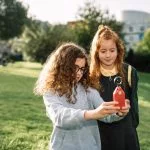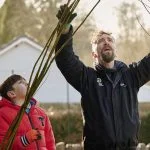The relationship between outdoor learning and growth.
Cognitive and Social Development
From an early age, children are experiencing the world around them through their senses. Outdoor learning can play a huge role in their cognitive and social development, and the research below has helped shape some of the projects that we run throughout the year.

Do you want to find out more?
Then take a look at who makes up our Advisory Boards, Trustees and Governors.
Then take a look at who makes up our Advisory Boards, Trustees and Governors.
Image Source: Malcolm Cochrane
Time Spent Outdoors During Preschool: Links with Children’s Cognitive and Behavioral Development
The findings from this study suggest that high exposure to outdoor environments might be a cheap, accessible and environmentally friendly way of supporting and enhancing children’s self-regulatory capacities and cognitive development.
Ulset, Vitaro et al (2017)
40-Second Green Roof Views Sustain Attention: The Role of Micro-breaks in Attention Restoration
This study provides evidence that a 40-s view of a flowering meadow green roof (non-traditional nature) can boost attention and provides further evidence of the effects of nature on cognitive functioning by showing the speed at which attention boosts occur even within a city scene.
Lee, Williams et al (2015)
Learning outside the Classroom
When planned and implemented well, learning outside the classroom contributed significantly to raising standards and improving pupils’ personal, social and emotional development.
Ofsted (2008)
Natural Thinking
Children undertaking outdoor activities in nature appear to improve symptoms of ADHD by 30% compared to urban outdoor activities and threefold compared to the indoor environment.
RSPB (2007)
At Home with Nature: Effects of “Greenness” on Children’s Cognitive Functioning
Results indicate that children whose homes improved the most in terms of greenness following relocation also tended to have the highest levels of cognitive functioning following the move. The results of this study suggest that the natural environment may play a far more significant role in the well-being of children than has previously been recognized.






